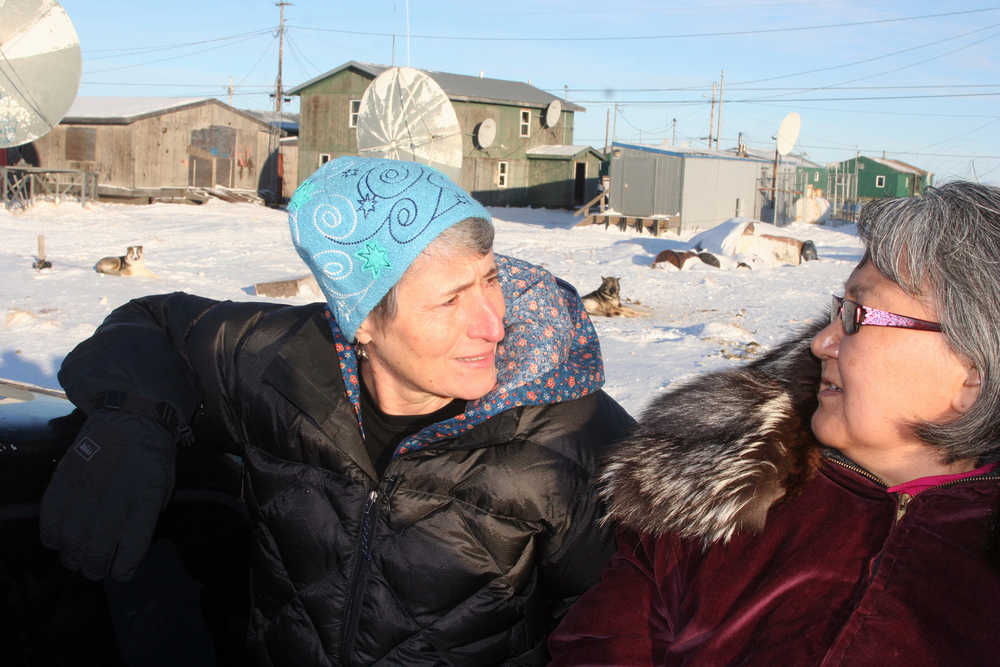KOTZEBUE (AP) — In temperatures slightly higher than Washington, D.C.’s, Interior Secretary Sally Jewell got a firsthand look Monday at the effect of climate change on an Alaska coastal community.
Jewell visited Kivalina, a village of 370 on a barrier island just off Alaska’s northwest coast, the Fairbanks Daily News-Miner reported.
Once protected from early winter storms by a natural barrier of sea ice, Kivalina has been ravaged in recent decades by erosion because climate warming prevents ice from forming until later in the winter.
“You can see the impact of coastal erosion in the village,” Jewell said. “You can hear the fear in people’s voices about what’s happening with climate change. Things are changing up here, and that’s part of what I’m on this trip to learn about.”
She also planned to attend a retreat sponsored by the Alaska Federation of Natives, the state’s largest Alaska Native organization.
Kivalina residents have moved bodies from the village graveyard to prevent them from washing away. Changing migration patterns have forced subsistence hunters to travel greater distances to harvest caribou and whales, villagers told Jewell.
With less land on the island to construct homes, one woman said, some families are cramming 10 to 20 people into two- and three-bedroom homes.
“Hopefully this session will bring the kind of visibility that you need to Kivalina for the challenges you have with climate change,” Jewell said, pointing to television cameras carried by reporters. “Because you’re on the front lines, right here.”
Alaska elected officials followed Jewell to nearby Kotzebue and had a different agenda. Alaska’s state budget receives upward of 90 percent of its revenue from the petroleum industry, and falling oil prices have the state looking at a multibillion-dollar deficit.
President Barack Obama’s announcement last month that he would seek wilderness status for the oil-rich coastal plain of the Arctic National Wildlife Reserve, and Jewell’s announcement that she would remove five Arctic Ocean areas from future offshore lease sales, prompted protests from Alaska officials.
“I may be an easy target,” Jewell said. “But the reality is oil prices have fallen dramatically, and that’s impacted the state’s budget. We are supporting responsible and safe oil drilling in the National Petroleum Reserve and in the Outer Continental Shelf.”
In talks with state lawmakers, she said at a news conference Tuesday afternoon in Anchorage, she mostly listened but pledged to work toward a more productive relationship. Their concern for developing the state’s resources with the goal of solving state problems was not echoed in Kivalina, she said.
“When I was in the village of Kivalina, they didn’t talk with me at all about resource development,” she said. “They talked to me about personal life and safety. They talked about subsistence. They talked about a change in climate, about melting permafrost that’s impacting berry picking and their movement across the landscape.”
U.S. Rep. Don Young, R-Alaska, said past administrations had treated Alaska like a “little jewel” without consideration for its residents, but Obama has been the worst.
“What’ll be accomplished? We don’t know,” Young said. “I’m not overly optimistic, because this is not the secretary’s, personally, I don’t think it’s her personal opinion. It’s an environmental group around the president. And the president’s decided to be against fossil fuels.”
The idea that global warming is caused by people is the “biggest charade” ever perpetrated on the people of Alaska, Young said.

